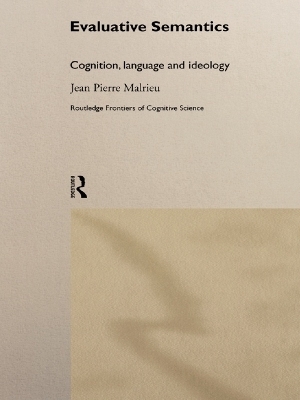
Evaluative Semantics
Cognition, Language and Ideology
Seiten
2013
Routledge (Verlag)
978-0-415-64758-8 (ISBN)
Routledge (Verlag)
978-0-415-64758-8 (ISBN)
This is the first comprehensive study of evaluative phenomena, from connotations to judgement of value, in language and discourse. It explores the cognitive foundations of evaluation, and emphasises its social dimension.
Evaluation, from connotations to complex judgements of value, is probably the most neglected dimension of meaning. Calling for a new understanding of truth and value, this book is a comprehensive study of evaluation in natural language, at lexical, syntactic and discursive levels. Jean Pierre Malrieu explores the cognitive foundations of evaluation and uses connectionist networks to model evaluative processes. He takes into account the social dimension of evaluation, showing that ideological contexts account for evaluative variability. A discussion of compositionality and opacity leads to the argument that a semantics of evaluation has some key advantages over truth-conditional semantics and as an example Malrieu applies his evaluative semantics to a complex Shakespeare text. His connectionist model yields a mathematical estimation of the consistency of text with ideology, and is particularly useful in the identification of subtle rhetorical devices such as irony.
Evaluation, from connotations to complex judgements of value, is probably the most neglected dimension of meaning. Calling for a new understanding of truth and value, this book is a comprehensive study of evaluation in natural language, at lexical, syntactic and discursive levels. Jean Pierre Malrieu explores the cognitive foundations of evaluation and uses connectionist networks to model evaluative processes. He takes into account the social dimension of evaluation, showing that ideological contexts account for evaluative variability. A discussion of compositionality and opacity leads to the argument that a semantics of evaluation has some key advantages over truth-conditional semantics and as an example Malrieu applies his evaluative semantics to a complex Shakespeare text. His connectionist model yields a mathematical estimation of the consistency of text with ideology, and is particularly useful in the identification of subtle rhetorical devices such as irony.
Jean-Pierre Malrieu
Introduction 1. Ideology and Discourse 2. Evaluation and Cognition 3 . Interpretative Shortcuts 4. Evaluative Semantics 5. Semantic Networks and Discourse Representation 6. Styled Semantic Networks 7. Dynamic Semantic Networks 8. Evaluation and Rhetorical Attitudes. Conclusion
| Erscheint lt. Verlag | 3.5.2013 |
|---|---|
| Reihe/Serie | Frontiers of Cognitive Science |
| Zusatzinfo | 21 Tables, black and white |
| Verlagsort | London |
| Sprache | englisch |
| Maße | 156 x 234 mm |
| Gewicht | 453 g |
| Themenwelt | Geisteswissenschaften ► Philosophie ► Sprachphilosophie |
| Geisteswissenschaften ► Psychologie ► Allgemeine Psychologie | |
| Geisteswissenschaften ► Psychologie ► Verhaltenstherapie | |
| Geisteswissenschaften ► Sprach- / Literaturwissenschaft ► Anglistik / Amerikanistik | |
| Geisteswissenschaften ► Sprach- / Literaturwissenschaft ► Literaturwissenschaft | |
| Geisteswissenschaften ► Sprach- / Literaturwissenschaft ► Sprachwissenschaft | |
| Sozialwissenschaften ► Soziologie ► Makrosoziologie | |
| ISBN-10 | 0-415-64758-4 / 0415647584 |
| ISBN-13 | 978-0-415-64758-8 / 9780415647588 |
| Zustand | Neuware |
| Haben Sie eine Frage zum Produkt? |
Mehr entdecken
aus dem Bereich
aus dem Bereich
Aspekte einer Ontologie des Logos
Buch | Hardcover (2024)
Springer Fachmedien (Verlag)
CHF 167,95
Wie die Menschheit zu ihrer größten Erfindung kam
Buch | Softcover (2022)
C.H.Beck (Verlag)
CHF 25,20
Macht und Legitimität politischer Sprache im Prozess der europäischen …
Buch | Softcover (2023)
Nomos (Verlag)
CHF 103,60


